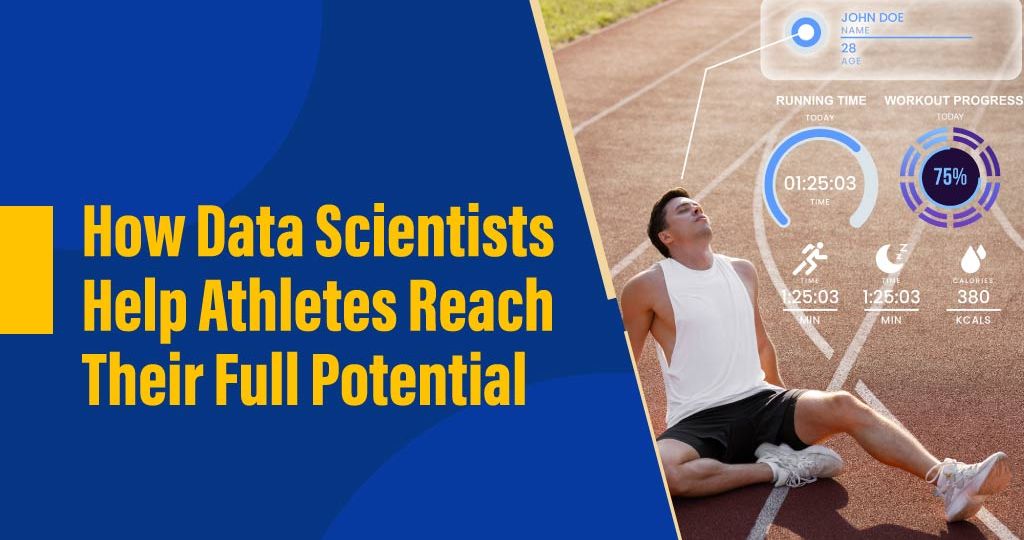
In the ever-changing world of athletics, the pursuit of perfection is constant. Athletes have a constant urge to exceed their own performance, set new standards, and scale new heights. Today, achieving greatness requires more than simply a strong work ethic and perseverance.
The significance of data scientists in sports has increased with the introduction of cutting-edge technology and data analytics. They convert unprocessed data into useful insights, which helps athletes reach their maximum potential. For those looking to enter this exciting field, pursuing a B.Tech AI & Data Science degree can provide the necessary skills and knowledge to excel in sports analytics and beyond. Here are some examples of how data scientists are transforming sports and helping athletes reach their full potential.
Optimizing Training Programs
The foundation of sports achievement is training. Data from an athlete’s training sessions including heart rate, speed, power output, and recuperation durations are gathered and analyzed by data scientists. They generate complete performance profiles using this data which trainers can use to construct specialized training plans.
These customized training plans guarantee that athletes are concentrating on their areas of weakness and avoiding overtraining. For example, data analysis can identify the ideal volume-to-intensity ratio in endurance sports to optimize improvements in performance while lowering the risk of injury.
Preventing and Managing Injuries
Any athlete’s worst nightmare is a history of injuries. A player may be out for several months, or even years due to them. By examining biomechanical data and past injury data, data scientists help reduce this risk. They can suggest changes to an athlete’s training schedule or technique by recognizing elements that lead to injuries such as poor technique or an excessive training load. Real-time data from wearable technology such as motion sensors and smart insoles can notify coaches and athletes of any problems before they worsen into major diseases.
Performance Analysis and Enhancement
Every millisecond matters when competing. Data scientists pursued from B.Tech artificial intelligence and data science in Coimbatore can analyze an athlete’s performance using sensor data and video analysis. Depending on the sport, they monitor parameters including swing speed, shot accuracy, and stride length. They pinpoint areas that require improvement by contrasting these measurements with industry standards or historical results. When it comes to swimming, for instance, data analysis can show whether a swimmer needs endurance training if their stroke rate decreases throughout a race. Athletes can increase their performance by fine-tuning their approaches and strategies.
Strategic and Tactical Planning
Data science is essential in team sports as tactics and plans are critical, even beyond individual success. Data scientists examine game logs to find patterns and trends in the performance of their team and rivals. Coaches can use this knowledge to create game plans that take advantage of their opponent’s shortcomings and counteract their strengths. In soccer, for example, a team’s plan for getting past the defense and scoring goals can be influenced by studying statistics on the passing patterns and defensive sets of their opponents. This data-driven strategy increases the chances of success by using empirical evidence to inform decision-making.
Emotional and Mental Health
Athletic performance involves both mental and physical aspects. Researchers using data science are starting to look into the psychological components of athletic performance. They can learn more about an athlete’s mental and emotional state by examining data from wearable devices that track stress levels and other physiological indications. Coaches and sports psychologists can use this information to create stress management plans, enhance concentration, and make sure athletes are psychologically ready for competition. An athlete who is mentally alert and well-rested is more likely to give their best effort.
Nutritional Optimization
An athlete’s performance and recovery are greatly influenced by their diet. To determine the best nutritional approaches, data scientists examine performance indicators and dietary consumption data. This could involve monitoring hydration levels and the consumption of macronutrients. For instance, data may show that an athlete performs best when they consume a specific ratio of carbohydrates to protein before a competition.
Fan and Engagement Analysis
Although it may not have a direct impact on an athlete’s performance on the field, an athlete’s overall success and motivation depend greatly on their ability to understand and interact with fans. To assist teams and players in strengthening their relationships with their fan base, data scientists examine social media exchanges, ticket sales, and other engagement measures. Increased financial support, encouragement, and support from fans are all factors that can contribute to an athlete’s success. Athletes, for instance, can create a devoted and encouraging fan following by customizing their social media material to what appeals to their audience.
The training, competition, and fan interaction of players have all changed as a result of the use of data science in sports. Athletes can realize their full potential when data scientists use data to optimize training, prevent injuries, increase performance, develop strategy, and preserve mental well-being. Data science will become increasingly important in sports as technology develops, providing even more advanced tools and insights. Athletes in this data-driven era reach unprecedented heights of success thanks to a winning blend of scientific analysis and human skill.
Enrolling in one of the best B.Tech colleges in Coimbatore can help you to work in this challenging field and can provide a strong foundation for your career.
